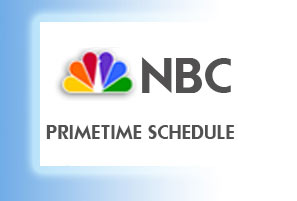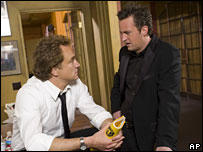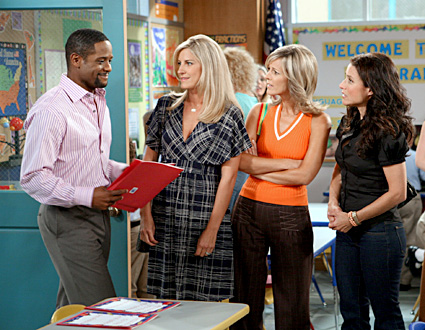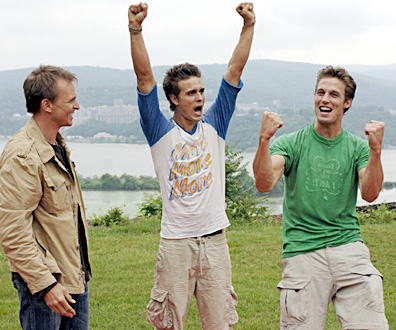Primetime’s Incompetent Liberalism
by: Shawn Shimpach / University of Massachusetts-Amherst

IN ADDITION TO OUR REGULAR COLUMNISTS AND GUEST COLUMNS, FLOW IS ALSO COMMITTED TO PUBLISHING TIMELY FEATURE COLUMNS, SUCH AS THE ONE BELOW. THE EDITORS OF FLOW REGULARLY ACCEPT SUBMISSIONS FOR THIS SECTION. PLEASE VISIT OUR “CALLS” PAGE FOR CONTACT INFORMATION.
As we, here in the U.S., have enjoyed our winter breaks, not only from the classroom as academics, but also from first-run series as members of the television audience, we have perhaps been afforded some time to contemplate this term/season's offerings. In particular, locating such a break between the national midterm elections and television's own midseason replacements has offered a fine opportunity to ponder the popular politics of primetime. This might include mild self-recriminations for more highly anticipating the next season of 24 than missing The West Wing, or for marveling at the popular success of South Park's infantile libertarianism while awaiting new episodes of The Boondocks. Specific to this season, so far, however, it should have probably also included some consideration of the mounting evidence that the primetime imaginary has completely bought into the myth of a nation split between blue and red states. For cable niche outlets this is not news (or rather, it is), with a number of channels taking red or blue as their primary color when making programming decisions. But this season the split nation notion has also begun to supply narrative content to a number of programs, become the underlying premise for some new shows, and elicited pleas (explicit from characters, implicit from television programmers) of “can't we all just get along?” In response, perhaps the most intriguing development this season has been the rise of a new trope on primetime; the performance of incompetent liberalism.
For obvious example, taking seriously not only the red state/blue state divide, but the talk-radio definition of liberalism as well, there is Studio 60 on the Sunset Strip. This show centers its narrative as well as animates its primary romantic subplot on the question “what does it mean to work in popular entertainment when at least half the nation seems to be opposed to my political beliefs and yet I am the one who's obviously correct?” There is ample evidence that Aaron Sorkin, who writes, executive produces, and apparently lives out most episodes, is taking this question personally. Main characters Matt Albie (Matthew Perry) and Danny Tripp (Bradley Whitford) seem modeled on Sorkin and producing partner Tommy Schlamme (with the drug problems displaced to the other guy, so far). Female lead Harriet Hayes (Sarah Paulson), a conflicted Christian comedienne, is based on Sorkin's ex, Kristin Chenoweth, right down to her 700 Club appearance and offer to provocatively pose in a men's magazine.1

As previous FLOW columns, numerous reviews, and even NBC's younger sibling outlet, MSNBC.com, all argue, the result is that Studio 60 does not adequately portray (much less successfully milk) its central conceit, the writing of comedy for live television. Moreover, the comedy isn't even funny. Instead, Sorkin's achingly earnest Liberal guilt collides with his magnanimous acknowledgements that people in the fly-over sections of the country have sincere (if nevertheless ultimately wrong) beliefs. Thus, for example, Nate Corrdry's Tom Jeter, a chivalrous if impish sketch comic, has issues with his (apparently dust-bowl era) Midwestern parents (who don't get him) and his enlisted brother (misguided but unassailably noble), currently serving in Iraq. On Studio 60, the politics of The West Wing prevail at the expense of the excitement, tensions, and everyday situations of running a big budget network comedy. Perhaps just as odd, however, is that the politics of the West Wing prevail as well, in the complete acceptance of a red state/blue state divide in the U.S. Not only does Studio 60 accept this schematic (the basis of Karl Rove's political strategies), it's completely and thoroughly invested. Characters speak not just with passion, but often with venom as they launch into unmotivated tirades about the nation's cultural divide, often only awkwardly tied to plot's goings on. The sheer ferocity with which Sorkin's show invests in the “culture wars” means that they inform all parts of the narrative, right down to the classic will they/won't they love story. Will Matt and Harriet overcome their cultural divide to (re)consummate their romance or won't they? Will the show survive (and the characters' various careers prosper and, we are told, well-written television prevail over trite reality contests), or won't it overcome the narrow minds of “media watchdog” groups and the need to balance “art” with commerce? The ostensible premise of a show within a show suggests a meta-textual reading that demonstrates additional layers of incompetent liberalism, such as the episode (“Wrap Party”) in which the subplot served as a patronizing (and excruciatingly awkward) object lesson in how and, crucially, why to hire a Black writer for the show. Liberalism throughout the layers of the show is performed cloyingly, self-consciously, and ultimately incompetently.
Meanwhile, CBS has offered an intentional performance of incompetent liberalism this season in the form of an endearing character trait in the certainly less earnest, although perhaps more prescient, The New Adventures of Old Christine. Itself a midseason replacement from a year ago, the program features Julia Louis-Dreyfus, née Elaine Benice, as Old Christine Campbell, who embodies an intentional performance of incompetent liberalism precisely crafted to overcome the legendary Seinfeld curse2 by playing the politics of the premise differently. In both Seinfeld and its de facto sequel, Curb Your Enthusiasm, individuals take pride in flaunting their selfish interests in the face of simply accepted (internalized, naturalized) moral and political imperatives of “society.” As Kramer–now ironically in a different register–puts it: “Jerry, this is the way society functions. Aren't you a part of society? Because if you don't want to be a part of society, Jerry, why don't you just get in your car and move the East Side!” Here a certain ethical liberalism is the granted worldview of society and the characters' lack of caring marks them as outside of society (not merely outside of liberalism). There are no culture wars, just amusingly selfish acts of adolescent rebellion against the social norms implied by pervading liberalism.
On Christine, we are not really meant to think that Christine's expressed liberal beliefs are insincere, but, as opposed to the world of Seinfeld, they do not exist simply as the rules of society (against which one might find some libertarian pleasure in rebelling). Instead they are offered as counterpoints to other, perhaps stronger, reigning belief systems. The comedy of the show emerges from her encounter with competing belief systems and the clear temptations they offer. Christine, like Aaron Sorkin, truly believes in her own liberal values, but simply isn't completely competent at living them. Indeed, liberalism in Christine is ruled primarily by incompetence. She works through its contradictions and the confining modes of social behavior (“politically correct” language, angst over private education for her son, driving hybrid cars, pretending to transcend race, etc.) that make its transgression at times tempting, at others inevitable.

In a recent episode, for example, Christine's Prius Hybrid, completely filled with spent bottles she's been meaning to recycle, is hit by a giant SUV. Amidst the ensuing conflict, the stereotypical trappings of Hollywood Liberalism (environmentalism as a form of privileged performance of style)3 are contextualized by their contrast with the class-based judgementalism of conspicuous consumption embodied by the SUV and its meanie mom driver. While her hybrid is being repaired, Christine herself is forced to rent an SUV and finds to her dismay that she enjoys its DVD player, the God-like view it offers of other drivers, and the apparent access this symbol of wasteful privilege affords (security guards no longer question her when she approaches her son's private school). Incompetent at negotiating this pleasure with her politics, Christine's personality transforms to the point that her interest in recycling, for example, is replaced with a callous sense of entitlement in all things social, environmental, and personal. It is only when she considers asking her son to lie on her behalf that her sense of liberalism (and liberal guilt) returns, intact if still incompetent. Throughout the series Christine is shown to be incompetent at integrating her politics into her daily encounters in life, but the humor of the show is premised on her sincere, if tortured, attempts to get better at doing so. Thus the show is meant to appeal to both the blue states and also, by defusing the show's own perceived liberal point of view (by having it performed incompetently to take the edge off), the red states.
This season's Primetime performance of incompetent liberalism has not been restricted only to characters transparently playing out the imagined political divide of TV's audience. The liberalism, moreover, has not been limited to only cable news stereotypes, but has included the incompetent performance of global neo-liberalism as well. For example, also airing on CBS this season was the tenth rendition of reality travelogue contest The Amazing Race. While certainly no Extreme Makeover: Home Edition, the show nonetheless embodies what would appear on paper to be a worst-case scenario of neo-liberal cultural imperialism, as it sends U.S. contestants on a highly mobile tour of developmentally differentiated world locations. Exoticized food (“We're going to India, honey, you ready for some curry?”),4 language, people, and cultures are offered as dramatic mise-en-scene to a brilliantly edited, narratively suspenseful, if ultimately banal game show in which political difference and economic disparity simply serve as colorful background.5
This season's self-congratulatory promotion offered the most “diverse” cast ever, which meant that Miss USA contestants competed against an intolerant father and his lesbian daughter, African-American moms, an athlete with an artificial leg, and brothers of East Asian decent. Additional two-member teams included African-American men described (by the CBS website) as “best friends from Cleveland, Ohio who have spent the past 15 years bonding over their love of food, Browns football and their shared Islamic faith,” who encountered a team of former college cheerleaders in the first episode. Alas even here liberalism was performed incompetently by characters who were only playing themselves when one cheerleader was soon shown asking, “Do Muslims believe in Buddha?” The other responded with “I don't know.” The men were then swiftly eliminated from the program (half-way through the first episode that also saw Vipul and Art, “the first Indian-American Team ever to compete on The Amazing Race,” eliminated by the end).

Such moments seem irresistible to the show's producers, as they demonstrate, after all, the unscripted reality of the show, illustrate the character traits of the contestants–sorting out the enlightened good guys from the ignorant bad–and allow us in the audience to feel either not so stupid (for wondering the same things) or smugly superior (for knowing not to ask aloud?). So important are such asides that the program inserts them “liberally” through most episodes, often apropos of nothing else going on, and even includes that rarest of primetime graphic embellishments, the subtitle (when such comments are whispered–from embarrassment?–at levels producers fear might be difficult for the audience to hear). The neo-liberal premise of “all the world's our game board as we illustrate unfettered travel and unimpeded access” is thus frequently undermined by contestants who act as if they are auditioning for a Borat sequel, parading their provincialism and localism even as they appeal to a specifically nationally conceived audience. Perhaps it was with CBS's advertisers in mind that contestant/character “Kimberly” remarked this season, while riding a bus through Chennai, “I want to be with the rich folk.”
What is remarkable about the popular politics of Primetime's performance of incompetent liberalism this season is not simply that the Primetime Imaginary has completely accepted the myth of a split nation–this is no surprise given that television professionals have long been habituated to high concepts and simple statistical demographic representations. The interesting thing is the specific way in which Primetime has responded so that each of these shows offer examples of attempts to (re)unite the nation. The fact that these shows find Primetime's Liberalism both the problem and the solution seems to speak to a nostalgia for the good old days when, for example, late night comedy was briefly relevant or, for another example, the days when primetime audiences amounted to the nation.6 Could it be that these hip new shows continue to lumber under the Network Era ideal of a truly national audience? Do enough anachronistic souls exist in Hollywood that the conflation of nation and audience still matters on Primetime? Does a nation divided threaten the united audience? Could Primetime's performance of incompetent liberalism be meant to unite us, again? Can't we all just get along, for Primetime's sake?
Despite the accumulating evidence (of audience fracture and niche) to the contrary, these shows have turned to performances of incompetent liberalism as a means to suture a divided nation, a divided audience, if only for Primetime's sake. Thus Studio 60 offers no hint that the program's continuing existence on NBC's Primetime schedule has nothing to do with a national audience at all, but with a small, albeit (we are told frequently by NBC) demographically and psychographically appealing, fraction of the primetime audience. Not only is this appealing to big ticket advertisers sorting through the multi-channel universe, but in the DiY-digital-convergence era, it means that Studio 60's viewership increases 10.9% when DVR timeshifting is considered.7 Despite such developments, commercial television during Primetime remains premised on transcending ideological difference. It seems apparent that regardless of popular politics, Primetime–for a while–will continue to cling to the apparently still crucial conflation of nation and audience. Since most shows (South Park notwithstanding)8 have a substantial lag time between conception of an episode and airing of that episode, all that remains to be seen for now is whether Primetime programming's self-flagellation over Hollywood's supposed liberal ideology is a real phenomenon that will continue after the midterm elections or merely self-immolation (with a desperate appeal across state colors) brought about by liberalism's perhaps hastily reported demise.
Notes
1 Jesse Green. “She Sings! She Acts! She Prays!” New York Times December 3, 2006 (Sunday, Late Edition – Final; Section 2; Column 1; Arts and Leisure; page 1).
2 If you dare doubt the existence of such a curse you need simply look past Jason Alexander's two failed sitcoms since Seinfeld (Bob Patterson, Listen Up) to see Michael Richards' own literal cursing. In the pervading spirit of DiY, it has been devastatingly summarized in a carefully crafted mashup made available through (where else?) distribution channel YouTube.com
3 A different, current take on Hollywood liberalism and its logocentric other takes the form of HGTV's new reality show variation of Green Acres (with an emphasis on the green), featuring Ed Begley Jr. as the sustainable-living über-guru and his wife, Rachelle, as in-house skeptic, Living with Ed.
4 Actual comment made this season by contestant/character “Rob.”
5 Such as when contestants visiting areas of sub-Saharan Africa have been made to engage in eating contests while local residents simply look on.
6 A relationship commented upon more than 20 years ago by John Hartley. See Hartley. 1987. “Invisible Fictions: Television Audiences, Paedocracy, Pleasure,” in Textual Practice 1:2. Pp 121-138.
7 See Lisa de Moraes. “Nielsen Fun Facts: Small Talk About Big Numbers,” The Washington Post December 21, 2006. C07; and “Traffic Report,” Wall Street Journal January 3, 2007. B03.
8 In an article circulated by the AP, Frazier Moore noted, for example, that “Reflecting the series' startling timeliness (each episode is created from scratch and aired within a week), “South Park” last October framed the failure of government agencies to respond to Hurricane Katrina in terms of a beaver dam that broke and flooded a nearby town, amid much finger-pointing but nobody helping.” Frazier Moore. “'South Park' Starting 10th Season with Bad Taste, Big Laughs and Believe it or not Heart,” The Associated Press, September 26, 2006.
Image Credits:
1. NBC Primetime Schedule
2. Studio 60 on the Sunset Strip
3. New Adventures of Old Christine
4. Amazing Race 10
Please feel free to comment.
Interesting points to ponder. I want to add that I’m curious about the use of the term “incompetent” in only that (and this may be your point) it serves an audience that conflates “liberalism” (read “change”) with going to hell in a hand basket. Many of the situations you discuss as revealing of incompetent liberalism are also moments in which characters take the time to reflect on a history of social (or other) politics and do their best to make a conscientious decision rather than a reactive one. While cliché to some extent, the conservative tendency to simply act/react in black-and-white terms based on often unexamined or reexamined convictions is, well, simple. The liberal tendency to reflect and weigh many positions before moving forward can be perceived as waffling. The liberal tendency to reexamine the path forward and perhaps change direction is often labeled “incompetent” and sometimes it is. But at its best, at least its goal is to be reflective and responsive to a changing world, rather than resistant just for the sake of being resistant.
The reverse
I am interested in knowing which television shows are seen to have a “conservative” bias. Obviously, Fox news is seen to be conservative, but which fictional shows, drama or comedy, are seen to be conservative? Are the conservative shows all older types of tv, such as multi camera sitcom, and cop dramas, or is there cutting edge tv that espouses a conservative political viewpoint? At least within the conservative news offerings I’ve seen, conservatism is never offered up as “incompetent.” Is there any “incompetent conservatism” to be seen on current television? (“Incompetent Conservatism” = foolish examples of conservatism which are still ultimately correct)
This article mentions Studio 60 however it does not touch on one of the aspects of the show that I found intriguing. Ever since I started watching Studio 60, I’ve been fascinated with how self-referential the show is – that is to say, the show makes references to things about the television business and take aim directly at issues that the ACTUAL show faces. Hollywood is often accused of having a liberal bias, and Studio 60 makes no attempt to hide the fact that the characters on the show (who are making a Hollywood TV show) share liberal views on issues. There is a constant series-long debate over which sketches are fit for air including “crazy christians” and “science schmience”.
In one particular episode, The Focus Group, it is revealed through focus group data that when the fictional Studio 60 audience was asked “is Studio 60 un-American” the answers were split 50/50. I found this fascinating because it sparked a debate, between the fictional producers in the show, as to what this data means and how it should be addressed. On one hand, Matt wondered why the question was asked and questions if the answers even matter. Danny suggests that they make less Bush jokes, less christian and ‘middle-America’ jokes in order to not piss off viewers. I thought that this was a very interesting expression of the conflict that actual show producers face when trying to target a general public audience.
This Flow TV article states that Studio 60 exemplifies “not only the red state/blue state divide, but the talk-radio definition of liberalism.” It also makes an interesting point, which is addressed in the Focus Group episode, that “performance of incompetent liberalism… is not simply that the Primetime Imaginary has completely accepted the myth of a split nation–this is no surprise given that television professionals have long been habituated to high concepts and simple statistical demographic representations.” This is interesting because in this studio 60 episode, we see how the producers interpret this evident divide and how they attempt to respond and “(re)unite the nation.”
Thanks for a marvelous posting! I truly enjoyed reading
it, you could be a great author.I will make certain to bookmark your blog and may come back sometime soon.
I want to encourage continue your great work, have a
nice afternoon!